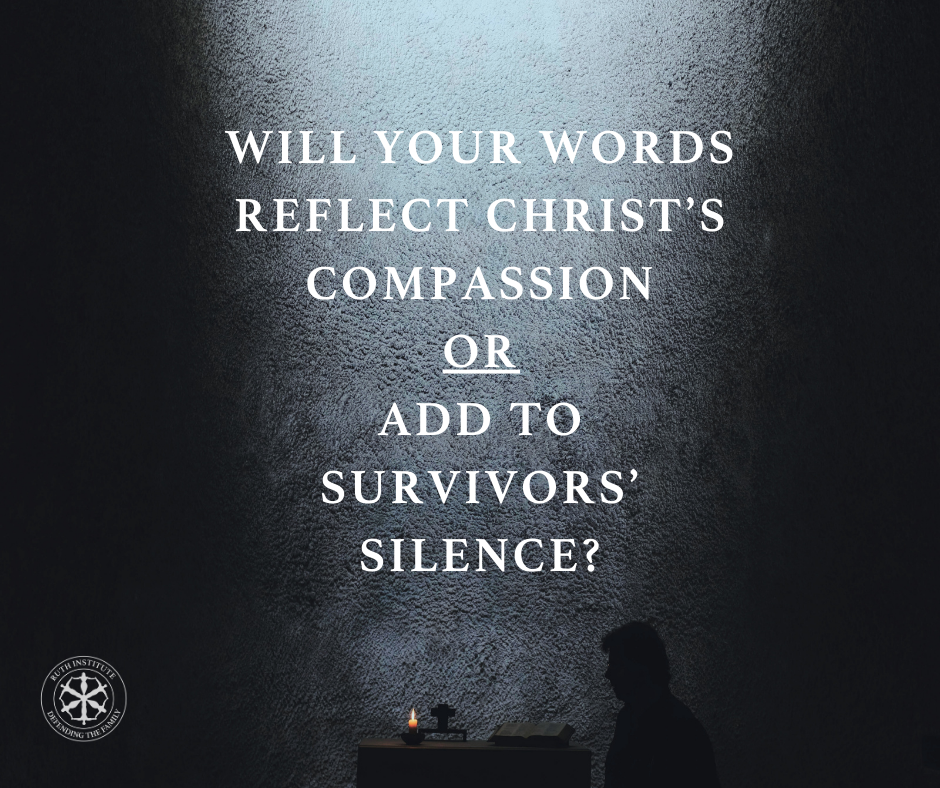Faith Hakesley
One of the most harmful things anyone can do to a survivor of abuse is to shame them by bringing up their past sins or struggles. This adds to the suffering they have already endured and deepens their wounds. We should demonstrate compassion, understanding, and love. Here’s what we shouldn’t do: we should never add to a survivor’s burden by mocking their pain or using their past choices as a weapon against them.

Understanding the Impact of Trauma
Many survivors of abuse (including clerical abuse survivors) turn to disordered lifestyles, substance abuse, or other harmful behaviors as a result of their trauma. These negative actions are often made in an attempt to numb the pain, reclaim control, or cope with the betrayal and suffering they’ve endured.
To shame someone for their bad choices especially without understanding the context of their trauma is cruel, not to mention counterproductive. Survivors often carry deep feelings of guilt and shame about their bad choices. When they are mocked or attacked for those choices, it reinforces the notion that many of them carry: that they are unworthy of love, healing, or redemption. It also sends a clear signal to survivors who have been silent: keep being silent because, if you do speak out, you will be treated the same way.
What Would Jesus Do?
Back in the 90’s, there was a popular slogan that encouraged people what Jesus would do in a given situation. I remember seeing WWJD (What would Jeus do?) plastered on just about everything. Jesus Himself modeled how we are to treat those who are hurting. While he never condoned sin and always told people to, “Go and sin no more,” he dined with sinners, healed the broken-hearted, and extended mercy even to those who felt unworthy of forgiveness.
As members of the Church, we are called to follow Christ’s example. Compassion, love, and understanding are not optional—they are a must. This includes our encounters with survivors of abuse.
Mocking a survivor’s pain or dismissing their suffering is a betrayal of the Church’s mission. The Church should be a source of healing and hope. Survivors are already dismissed far too often, silenced, or treated like lepers by enablers within the Church. To join in the dismissal of their pain or to publicly shame or ridicule them for life choices that were the result of their abuse, is reprehensible. Sadly, I have witnessed many Catholics doing this, including Catholic leaders and influencers. They should be striving to set a better example.
Address the Issues
Clerical abuse is a deeply sensitive and painful issue, and we must confront it with honesty and responsibility. The reality of trust being broken, the betrayal, corruption, and the lack of transparency and accountability cannot be ignored. As we work to address these grave concerns and rebuild what has been broken, our efforts should be centered on hope, healing, and pursuit of justice for survivors.
We must remember survivors have endured unimaginable pain. They have suffered at the hands of those entrusted to represent Christ. The betrayal they experienced runs deep, and so do their scars. Even if a survivor turns to a disordered lifestyle, engages in promiscuous behaviors, or uses substances like drugs or alcohol as a means of coping, their story should never be weaponized or used against them. These behaviors are often a response to trauma, not a reflection of who they are at their core. Personal attacks on survivors are never acceptable, nor are they productive, regardless of how challenging their behavior might appear.
Showing Accountability and Compassion
I want to be clear: this does not mean survivors should be held to a different standard. If their actions include harmful behaviors like abuse, dishonesty, or manipulation, these issues must be addressed with care and respect. A survivor shouldn’t be “let off the hook” simply because of their trauma. However, we should always treat them with love, care, and dignity. For example, publicly calling out a survivor for their negative life choices is not acceptable. It’s far more constructive to pray for them. If possible, we can offer support or assist in connecting them with the help they need.
We must also remember that survivors are always listening and watching. How we treat others speaks volumes to them about how they will be treated if they come forward with their own pain. When we demonstrate compassionate behavior, we create a safe space for other survivors to come forward. Kicking or shaming them only drives them further into isolation and despair.
What do Survivors Need?
Here are some things survivors need from us:
Compassion: We should listen with compassion without judging them for their life choices.
Love: We can assure survivors that they are valued and cherished by God and us.
Understanding: We should show survivors that we understand that trauma can shape behavior (including negative ones). Healing is often a lifelong journey.
Prayers: We should offer genuine prayers for their healing, peace, and hope.
Hope: We should remind survivors that there is hope for anyone regardless of what they have been through. No matter what negative choices a survivor has made as a result of abuse, there is hope for healing.
A Call to Action
Not everyone will support survivors in the same way. Some may choose to quietly pray and offer private words of encouragement, expressing gratitude for a survivor’s bravery. Others may use their social media platforms to amplify survivor stories or advocate for them publicly. There are so many possibilities!
Regardless of what feel called to do individually, as members of the Catholic Church, let us commit to being advocates for survivors. Let us challenge the culture of shame, dismissal, and mockery that so often permeates our communities, especially online. Survivors need fellow brothers and sisters in Christ who will stand with them, affirm their dignity, and encourage them on their healing journey.
We each contribute in different ways, and not all of us are called to do the same things. But together, we can make a difference.
Remember, every word you speak and every action you take sends a message to survivors. Choose your words carefully. Let your actions reflect Christ’s love. Let us strive to be His hands and feet on earth. We should be a Church that heals, not harms. The Church should lift up, not tear down. Catholics should embody the hope, mercy, and grace that survivors so desperately need.
To all survivors reading this: You are loved. You are valued. You are seen. There is always hope! In the words of St. Pope John Paul II, “We are not the sum of our weaknesses and failures; we are the sum of the Father’s love for us and our real capacity to become the image of His Son.”


